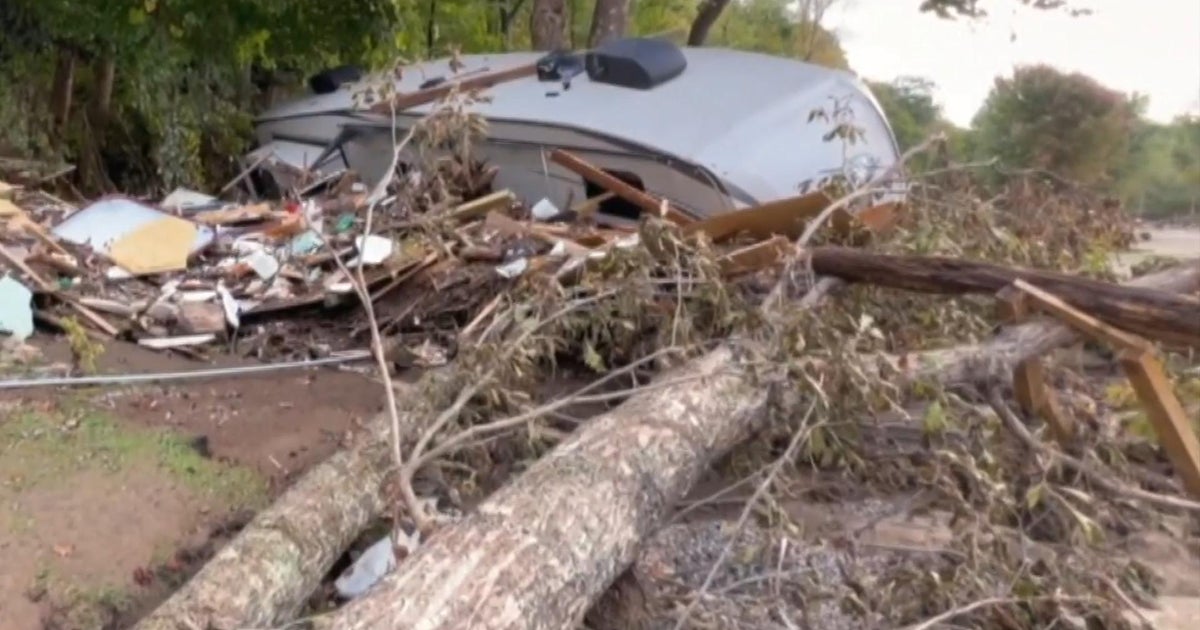CBS News
Hurricane Helene conspiracy theories about lithium mining, weather control spread widely

In the wake of Hurricane Helene, false rumors about the federal response have spread rapidly on social media. More extreme conspiracy theories have also taken root, including claims that politicians manipulated the weather to target Republican areas and that the government is trying to seize land in North Carolina to mine lithium.
The false claims have been amplified by high-profile politicians and social media influencers with large followings. Despite gaining millions of views online, these claims have been debunked by officials and experts, who stress that the government response remains focused on recovery efforts in the hardest-hit regions. Here are two fact checks about the main claims.
False claim: The government controlled the weather to make Helene hit Republican areas
The false claim that the government controlled the weather to manipulate Helene’s path to hit majority Republican areas has racked up millions of views on social media.
Georgia Rep. Marjorie Taylor Greene posted on X , saying: “Yes they can control the weather. It’s ridiculous for anyone to lie and say it can’t be done.” The post, which had more than 40 million views at the time of writing, was also debunked via a Community Note on X.
Greene also posted what she described as a map of areas affected by Helene – in states including Florida, Georgia and the Carolinas – with an overlay showing the area is home to a majority of Republican voters.
Conspiracy theorist Alex Jones also amplified the claim, saying “Bottom line the federal government could have killed the storm in the Gulf of Mexico.” Both Greene and Jones pointed to cloud seeding as evidence that the government controlled Hurricane Helene.
Cloud seeding is a type of weather modification that can improve a cloud’s ability to create rain or snow, according to the Nevada-based Desert Research Institute, which has its own cloud seeding program. Cloud seeding has existed since the 1940s, and dozens of countries have weather modification programs.
Hurricane modification through cloud seeding was explored in the years between 1962 and 1983, but the project ended after seeding was found to be ineffective compared to the natural forces of the hurricane, according to the National Oceanic and Atmospheric Administration.
Conspiracies around cloud seeding routinely appear after major weather events, including flooding in Dubai and storms in California. When asked if cloud seeding played a role in the Dubai floods, a meteorologist told the Associated Press “…when it comes to controlling individual rain storms, we are not anywhere close to that.”
False claim: The government is seizing land in a North Carolina town to allow lithium mining
False claims that authorities are trying to seize Chimney Rock, North Carolina, to commandeer a lithium mine have spread on social media platforms like X, TikTok and Facebook.
Some of the rumors cite an alleged “town meeting” where officials said they would bulldoze Chimney Rock and the government would own the land. One post on X spreading the false claim garnered more than 6 million views.
Rutherford County Emergency Management said claims of a government seizure of Chimney Rock “are entirely false,” adding that no “special meeting” was held to discuss seizing the town. Rutherford County Emergency Management clarified that North Carolina lawmakers met with local officials to request federal and state support.
Some social media users spreading the claim referenced the North Carolina city of Kings Mountain, where a lithium mine is projected to reopen. Others reference specific companies like Piedmont Lithium, which aims to build a lithium mine in Gaston County, North Carolina.
These proposed lithium mines are located about 80 to 100 miles away from Chimney Rock.
Local officials are actively working to reconstruct damaged infrastructure in the town. Chimney Rock has posted updates online about its recovery efforts, including rebuilding Main Street, restoring power and clearing debris.
The Federal Emergency Management Agency (FEMA) said in its new “Rumor Response” page that the agency cannot seize a resident’s property or land.
Federal and state officials have said misinformation and conspiracy theories are hindering efforts to provide aid and accurate information to victims.
Deanne Criswell, who leads FEMA, said the false claims are “demoralizing” to aid workers, while Republican Sen. Thom Tillis of North Carolina told “Face the Nation” on Sunday that the claims distract from rescue work.
CBS News
Russia says suspect detained in killing of Gen. Igor Kirillov, head of Russian chemical weapons unit

Moscow — Russia’s security service said Wednesday that it had detained a suspect in the killing of a senior general in a Moscow bomb blast. The suspect was described as an Uzbek citizen whom the agency said had been recruited by Ukrainian intelligence services.
Ukrainian security sources told CBS News on Monday that the Security Service of Ukraine (SBU) was behind the explosion that killed Lt. General Igor Kirillov. The claim couldn’t be independently verified, but Russian officials quickly vowed to take revenge against Ukraine’s leaders.
Russia’s Federal Security Service didn’t name the suspect, but it said he was born in 1995. According to an FSB statement, the suspect said he was recruited by Ukrainian special services.
AFPTV / AFP via Getty Images
“Kirillov was a war criminal and an absolutely legitimate target, since he gave orders to use prohibited chemical weapons against the Ukrainian military,” an informed source in the SBU asserted to CBS News. “Such an inglorious end awaits everyone who kills Ukrainians. Retribution for war crimes is inevitable.”
Kirillov was killed by a bomb hidden in an electric scooter outside his apartment building in Moscow, a day after Ukraine’s security service leveled criminal charges against him. His assistant also died in the attack.
The FSB said the suspect had been promised a reward of $100,000 and permission to move to a European Union country in exchange for killing Kirillov. It said that, acting on instructions from Ukraine, the suspect traveled to Moscow, where he picked up a homemade explosive device. He then placed the device on an electric scooter and parked it at the entrance of the residential building where Kirillov lived.
The suspect then rented a car to monitor the location and set up a camera that livestreamed video from the scene to his handlers in the central Ukrainian city of Dnipro. When Kirillov was seen leaving the building, the suspect detonated the bomb.
According to the FSB’s statement, the suspect faces “a sentence of up to life imprisonment.”
Kirillov, 54, was the chief of the Russian military’s radiological, biological and chemical protection forces. Either Kirillov himself or his military unit were sanctioned by several countries, including the U.S., Britain and Canada, for the alleged use of chemical weapons on the battlefield in Ukraine. On Monday, Ukraine’s SBU had opened a criminal investigation against him, accusing him of directing the use of banned chemical weapons.
Maxim Shemetov/REUTERS
Ukraine’s SBU has said it recorded more than 4,800 occasions when Russia used chemical weapons on the battlefield since President Vladimir Putin launched his full-scale invasion in February 2022. In May, the U.S. State Department announced sanctions against Kirillov’s unit, saying the U.S. had recorded the use of chloropicrin, a poison gas first deployed in World War I, against Ukrainian troops.
Russia has denied using any chemical weapons in Ukraine and, in turn, has accused Kyiv of using toxic agents in combat, and Kirillov was allegedly behind the spread of that propaganda.
Kirillov, who had been in his post since April 2017, was accused by the U.S. government of helping to spread disinformation about biological weapons and research.
In March 2023, about a year into Russia’s full-scale invasion, the U.S. State Department said Kirillov had “significantly increased his media engagement” to issue repeated, baseless claims that the U.S. government had been involved in creating both the mpox virus and COVID-19, and that the U.S. “is developing biological weapons able to selectively target ethnic groups.”
“The U.S. Government is concerned that this false narrative may be a prelude for a false-flag operation, where Russia itself uses biological, chemical, or nuclear weapons in Ukraine, and then attempts to blame it on Ukraine and/or the United States,” the State Department said at the time.
Sefa Karacan / Anadolu via Getty Images
The bomb used in Tuesday’s attack was triggered remotely, according to Russian news reports. Images from the scene showed shattered windows and scorched brickwork.
Russia’s top state investigative agency said it’s looking into Kirillov’s death as a case of terrorism, and officials in Moscow vowed to punish Ukraine.
CBS News
Suspect detained in killing of Gen. Igor Kirillov, head of Russia’s biological, chemical forces in Moscow blast

Moscow — Russia’s security service said Wednesday that it has detained a suspect in the killing of a senior general in Moscow.
The suspect was described as an Uzbek citizen recruited by Ukrainian intelligence services.
Russia’s Federal Security Service, or FSB, didn’t name the suspect, but said he was born in 1995. According to an FSB statement, the suspect said he was recruited by Ukrainian special services.
Ukrainian security sources had told CBS News Monday that the Security Service of Ukraine (SBU) killed Kirillov in a special operation. The claim couldn’t be independently verified, but Russian officials quickly vowed to take revenge against Ukraine’s leaders.
AFPTV / AFP via Getty Images
Lt. Gen. Igor Kirillov was killed Tuesday by a bomb hidden in a scooter outside his apartment building in Moscow, a day after Ukraine’s security service leveled criminal charges against him. His assistant also died in the attack. A Ukrainian official said the service carried out the attack.
The FSB said the suspect had been promised a reward of $100,000 and permission to move to a European Union country in exchange for killing Kirillov.
The agency stated that, acting on instructions from Ukraine, the suspect traveled to Moscow, where he picked up a homemade explosive device. He then placed the device on an electric scooter and parked it at the entrance to the residential building where Kirillov lived.
The suspect then rented a car to monitor the location and set up a camera that livestreamed footage from the scene to his handlers in the central Ukrainian city of Dnipro. Once Kirillov was seen leaving the building, the suspect detonated the bomb.
According to the FSB’s statement, the suspect faces “a sentence of up to life imprisonment.”
Kirillov, 54, was the chief of the military’s nuclear, biological and chemical protection forces and was under sanctions from several countries, including the U.K. and Canada, for his actions in Moscow’s military operation in Ukraine. On Monday, Ukraine’s Security Service, or SBU, opened a criminal investigation against him, accusing him of directing the use of banned chemical weapons.
Russia has denied using any chemical weapons in Ukraine and, in turn, has accused Kyiv of using toxic agents in combat.
Kirillov, who took his current job in 2017, was one of the most high-profile figures to level those accusations. He held numerous briefings to accuse the Ukrainian military of using toxic agents and planning to launch attacks with radioactive substances – claims that Ukraine and its Western allies rejected as propaganda.
The bomb used in Tuesday’s attack was triggered remotely, according to Russian news reports. Images from the scene showed shattered windows and scorched brickwork.
Sefa Karacan / Anadolu via Getty Images
Russia’s top state investigative agency said it’s looking into Kirillov’s death as a case of terrorism, and officials in Moscow vowed to punish Ukraine.
CBS News
Indiana conducts first execution in 15 years, puts quadruple killer to death

Michigan City, Indiana — An Indiana man convicted of killing four people including his brother and his sister’s fiancé decades ago was put to death Wednesday, without any independent witness, marking the state’s first execution in 15 years.
Joseph Corcoran, 49, was pronounced dead at 12:44 a.m. CST at the Indiana State Prison in Michigan City, Indiana, the Indiana Department of Correction said in a statement. CBS Indianapolis affiliate WTTV reports that officials said the execution process started just after midnight.
Indiana Department of Corrections via AP
Corcoran was scheduled to be executed with the powerful sedative pentobarbital, but the state agency’s statement did not mention that drug. Corcoran’s execution was the 24th in the U.S. this year.
According to WTTV, the statement said Corcoran told officials his last words were, “Not really. Let’s get this over with.”
He was convicted in the July 1997 shootings of his brother, 30-year-old James Corcoran, his sister’s fiancé, 32-year-old Robert Scott Turner, and two other men, Timothy G. Bricker, 30, and Douglas A. Stillwell, 30.
According to court records, before Corcoran fatally shot the four victims he was under stress because the forthcoming marriage of his sister to Turner would necessitate moving out of the Fort Wayne, Indiana, home he shared with his brother and sister.
While jailed for those killings, Corcoran reportedly bragged about fatally shooting his parents in 1992 in northern Indiana’s Steuben County. He was charged in their killings but acquitted.
Last summer, Gov. Eric Holcomb announced plans to resume state executions following a yearslong hiatus marked by a scarcity of lethal injection drugs nationwide.
The state provided limited details about the execution process, and no media witnesses were permitted under state law.
Indiana and Wyoming are the only two states that do not allow members of the media to witness state executions, according to a recent report by the Death Penalty Information Center.
Corcoran’s attorneys had fought his death penalty sentence for years, arguing he was severely mentally ill, which affected his ability to understand and make decisions. This month, his attorneys asked the Indiana Supreme Court to stop his execution but the request was denied.
Corcoran exhausted his federal appeals in 2016. But his attorneys asked the U.S. District Court of Northern Indiana last week to stop his execution and hold a hearing to decide if it would be unconstitutional because Corcoran has a serious mental illness. The court declined to intervene Friday, and the U.S. Court of Appeals for the 7th Circuit did the same Tuesday.
Corcoran’s attorneys then asked the U.S. Supreme Court issue an emergency order halting his execution, but the high court denied their request for a stay late Tuesday, ending Corcoran’s options with the courts.
His sole remaining hope then became Holcomb, who could have commuted Corcoran’s death sentence. But that commutation never came and the execution proceeded as scheduled.
WTTV says Holcomb issued a statement saying Corcoran’s case “has been reviewed repeatedly over the last 25 years – including 7 times by the Indiana Supreme Court and 3 times by the U.S. Supreme Court, the most recent of which was tonight. His sentence has never been overturned and was carried out as ordered by the court.”
Indiana’s last state execution was in 2009 when Matthew Wrinkles was put to death for killing his wife, her brother and sister-in-law in 1994.
Since then, 13 executions were carried out in Indiana, but those were initiated and performed by federal officials in 2020 and 2021 at a federal prison in Terre Haute.
State officials have said they couldn’t continue executions because a combination of drugs used in lethal injections had become unavailable.
For years, there has been a shortage across the country because pharmaceutical companies have refused to sell their products for that purpose. That’s pushed states, including Indiana, to turn to compounding pharmacies, which manufacture drugs specifically for a client. Some use more accessible drugs such as the sedatives pentobarbital or midazolam, both of which, critics say, can cause intense pain.
Religious groups, disability rights advocates and others have opposed his execution. About a dozen people, some holding candles, held a vigil late Tuesday to pray outside the prison, which is surrounded by barbed wire fences in a residential area about 60 miles east of Chicago.
“We can build a society without giving governmental authorities the right to execute their own citizens,” said Bishop Robert McClory of the Diocese of Gary, who led the prayers.
Other death penalty opponents also demonstrated outside the prison Tuesday night, some holding signs that read “Execution Is Not The Solution” and “Remember The Victims But Not With More Killing.”
“There is no need and no benefit from this execution. It’s all show,” said Abraham Borowitz, director of Death Penalty Action, his organization that protests every execution in the U.S.
Prison officials said in a brief statement Tuesday evening that Corcoran “requested Ben & Jerry’s ice cream for his last meal.”
Corcoran said farewell late Tuesday to relatives, including his wife, Tahina Corcoran, who told reporters outside the prison that they discussed their faith and their memories, including attending high school together. She reiterated her request for Indiana’s governor to commute her husband’s death sentence.
Tahina Corcoran said her husband is “very mentally ill” and she didn’t think he fully grasped what was happening to him.
“He is in shock. He doesn’t understand,” she said.












